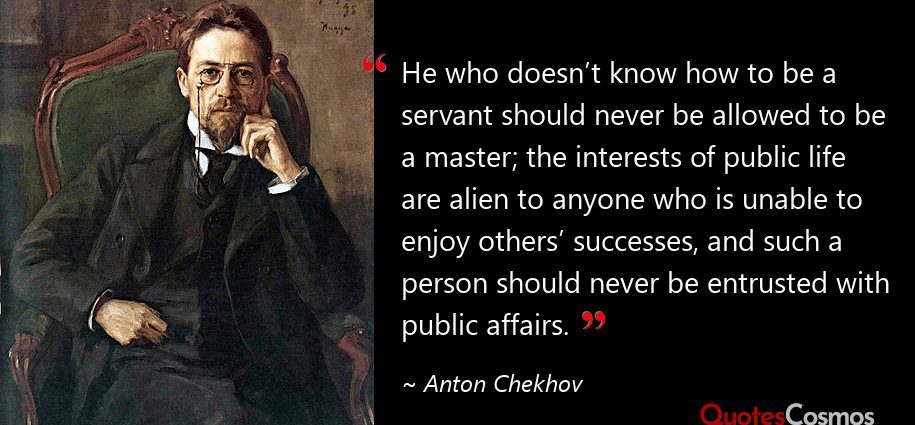“One can revere the mind of Tolstoy. Admire the elegance of Pushkin. Appreciate Dostoevsky’s moral quest. Gogol’s humor,” wrote Sergey Dovlatov. And he concluded: “However, I only want to be like Chekhov.”
After reading Chekhov, we noticeably grow above ourselves, but we can hardly formulate some intelligible recipe for a “correct life”. If something comes to mind from the sphere of literal life-building (“squeezing out a slave drop by drop”), then this is from private letters, not for us. If we find direct recommendations directly in the works of art by Anton Pavlovich (“the thing must be done”), most likely they do not come from the most intelligent and likeable heroes.
There are people who know how to live. They become leaders, bankers, deputies, willingly make decisions for themselves and for others. Chekhov has quite charming heroes with a positive active program, but other people more often fall into the field of his sympathy. Ridiculously stoic, like Uncle Vanya. Or not finding a way out, like the heroes of “The Lady with the Dog.” Or doomed to extinction, like Ranevskaya. The existence of Chekhov within literature is also mysterious. It is hardly possible to doubt the division of literature into lyrics, epic and drama. Chekhov, however, avoids verse (that is, direct lyrics), the novel form (direct epic), and carefully removes dramatic conflicts of interest from his plays. Strictly speaking, Chekhov is busy with something incomprehensible – or with everyone at once. And this “all at once” is unusually in demand; Anton Pavlovich is one of the most published, read and screened writers in the world along with Dickens, Tolstoy, Dostoyevsky, Shakespeare and Somerset Maugham. It is unlikely that we will be able to take and unravel Chekhov’s riddle, but perhaps it will be possible to formulate it more accurately.
His dates
- January 17, 1860: born in Taganrog, the third son in a poor bourgeois family.
- 1880: first publications.
- 1884: graduated from the medical faculty of Moscow University; the first collection of stories “Tales of Melpomene” (signed by A. Chekhonte).
- 1888: Half Pushkin Prize of the Academy of Sciences for the collection At Twilight.
- 1890: trip to Sakhalin.
- 1896: failure of The Seagull; renunciation of the theatre.
- 1898: the success of “The Seagull” in the Stanislavsky Moscow Art Theater.
- 1900: elected to the Pushkin branch of the Academy of Sciences.
- 1901: Married to Moscow Art Theater actress Olga Knipper.
- July 2, 1904: died in Badenweiler (Germany) from tuberculosis.
Keys to Understanding
Challenge the little man
Not only that the hero of the story “The Death of an Official” is dying before our eyes. He – which is unique in Russian literature – dies ingloriously and without winning our sympathy. Even his last name, Chervyakov, unequivocally expresses the author’s attitude to his life and death. Meanwhile, the parallel between The Death of an Official and The Overcoat is obvious: Chekhov, with his story, challenges Gogol himself and the entire tradition of Russian literature. According to Chekhov, being a small person is not a sympathetic misfortune, but a guilt worthy of condemnation. Voluntary self-determination. A universal alibi that allows you to surrender to the mercy of fate. Chekhov had the right to such a view. Given its origin, it was practically doomed to vegetate. And how naturally and effortlessly this medical student becomes the first writer and one of the most respected people of the empire!
“AND IT SEEMED THAT A LITTLE MORE — AND THE SOLUTION WILL BE FOUND, AND THEN A NEW, BEAUTIFUL LIFE WILL BEGIN; AND IT WAS CLEAR TO BOTH THAT… THE MOST DIFFICULT AND DIFFICULT JUST BEGINS.”
Dream or act?
Suppose we are not small people. Probably, you need to set yourself ambitious goals – and achieve them. But here Ionych (a classic loser) dreamed of treating people – and he treats, does not stop. Of the main characters of The Seagull, both women are actresses, both men are writers, that is, we are, as it were, in paradise, in the space of childhood dreams come true. But everyone is unhappy. Worse, not everyone is charming in their misfortune. Carefully looking at Chekhov’s heroes, we find a turning point: here the hero stopped dreaming, and began to realize his dream. Here something incredibly important dies in him, and figures like Lopakhin find themselves on the periphery of the sympathies of the author and the reader. What to do? Keep dreaming? But what about useful activities? Chekhov throws up his hands. As, by the way, the artist from the “House with a Mezzanine” does not know how to object to the ardent defender of the Zemstvos and other progressive trends…
In full growth
“Chekhov’s lyrics will become alien to these people at best, annoying and hostile at worst,” wrote Vladislav Khodasevich about us in 1929. – Whoever the future Russia consists of, it will not consist of Chekhov’s heroes. In life, they will only be sick exceptions, in literature they will fall out of love, because they will no longer understand. Only now we are beginning to grow up to Chekhov. In such concepts as personal space (you will agree, very Chekhovian in fact), tolerance. We gradually get used to the fact that the other person is a cosmos, too complex for us to understand, and we learn to live among the cosmos. Not that any of us looked like Chekhov’s hero, but all of us together sometimes look like his heroes. And this is probably not the worst situation in our lives.
About it
- Collected works of A.P. Chekhov in 15 volumes Book Club Knigovek, 2010.
- Donald Rayfield “The Life of Anton Chekhov” B.S.G.-Press, 2008.










